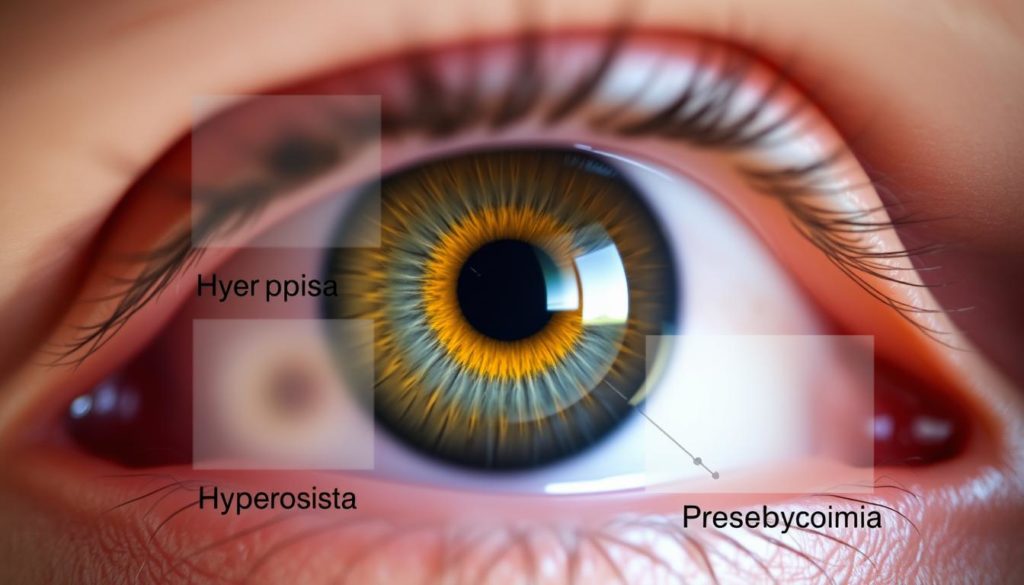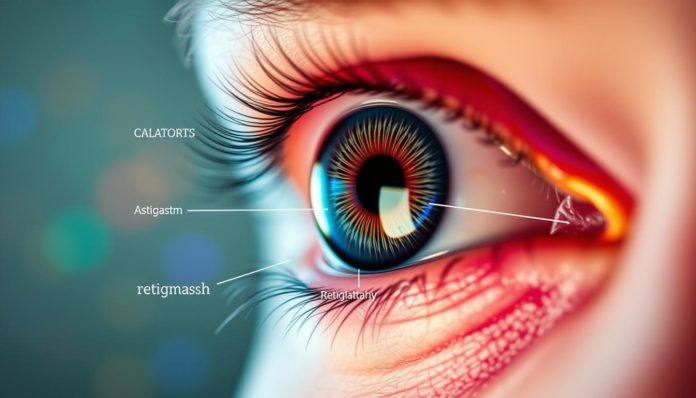Did you know 75% of adults have blurry vision at some point? This fact shows how common vision problems are. It’s crucial to know why vision gets blurry. While minor issues like needing new glasses are common, some reasons could be signs of serious health problems needing quick care.
Blurry vision makes it hard to see details clearly. This often leads to squinting, blinking, and rubbing the eyes. The causes vary from simple refractive errors like nearsightedness to more complex conditions such as retinal issues and nerve problems.
Sometimes, sudden blurry vision is a red flag for a stroke or urgent medical issue. Knowing the causes of blurry vision and practicing good eye care can help you deal with and prevent vision problems better.
Common Refractive Errors Causing Blurry Vision
Refractive errors are a typical reason for blurry eyes. They make it hard to see things close or far away. This happens because the eye doesn’t focus light right on the retina, leading to unclear images. Luckily, you can fix these issues with glasses, contact lenses, or surgery.

Nearsightedness (Myopia)
Myopia, or nearsightedness, means you can see things near you better than those far away. It happens if the eye is too long or the cornea’s curve is too much. This makes light focus in front of the retina. You can correct your vision with glasses or LASIK surgery.
Farsightedness (Hyperopia)
Hyperopia, or farsightedness, is the reverse of myopia. It makes it hard to see things up close because light focuses behind the retina. Symptoms include headaches, eye strain, and blurry vision when reading or using a computer. Fixing this usually means convex lenses or surgery.
Astigmatism
Astigmatism happens when the cornea or eye’s lens is not the right shape. This shape issue scatters light, causing blurred or distorted vision at all distances. It can occur with myopia or hyperopia. Glasses, contacts, or laser surgery can correct it.
Presbyopia
Presbyopia is linked to aging. The eye’s lens gets less flexible over time, making it hard to see things up close. It often starts in your 40s. Reading glasses or bifocals can help. It’s a main reason for blurry vision in older people, stressing the importance of regular eye checks.
Eye Conditions that Cause Blurry Vision
Various eye conditions can make your vision blurry. Each part of the eye can be affected differently. Knowing about these conditions helps doctors treat them effectively. Here, we’ll discuss a few key conditions that can blur your sight.

Age-Related Macular Degeneration
Macular degeneration mainly hits older people, leading to vision loss. It affects the retina’s center, crucial for seeing fine details. This can make reading tough and blur faces and details for those affected.
Cataracts
Having cataracts can feel like looking through a fogged window. Vision gets cloudy, blurred, or dim. They worsen over time, making daily tasks hard. Surgery is often needed to see clearly again.
Glaucoma
Glaucoma damages the optic nerve, sometimes due to high pressure inside the eye. It starts with losing side vision, and without treatment, it can rob central vision. Early detection and regular eye checks are vital.
Dry Eye Syndrome
Dry eyes need treatment to feel better. This issue means not enough moisture on the eye surface. It causes redness, gritty feelings, and blurry vision. Treatments include artificial tears or prescription meds.
- Macular degeneration: Affects central vision, challenging daily tasks requiring detailed vision.
- Cataracts symptoms: Include clouded vision, often necessitating surgery for clarity.
- Glaucoma effects: Can lead to irreversible vision loss without timely treatment.
- Dry eye treatment: Critical to alleviate discomfort and improve vision clarity.
These conditions each cause blurry vision for different reasons. Regular eye check-ups and timely care are key to keeping your vision sharp.
Causes of Sudden Blurry Vision
It’s worrying when your vision suddenly goes blurry. This often points to serious health issues. It’s important to deal with this quickly to avoid more problems.
Stroke
Strokes are serious and can make you lose vision suddenly. They affect how the brain handles what we see. Knowing the signs of stroke and vision issues right away can save lives.
Retinal Detachment
Seeing floaters, light flashes, or shadows? These are urgent signs of retinal detachment. If the retina pulls away from the eye’s back, not acting fast can cause lasting vision loss.
Closed-Angle Glaucoma
Closed-angle glaucoma spikes your eye pressure quickly. You might feel extreme eye pain, get nauseous, and lose vision suddenly. This requires quick medical help to stop lasting harm.
Optic Neuritis
Optic neuritis means your optic nerve is inflamed, leading to blurry vision. This issue often comes with other neurological symptoms. It’s crucial to check it out to find the root cause.
The Role of Diabetes in Vision Problems
Diabetes has a big impact on vision health. If not managed well, it can lead to serious eye issues. Knowing how to look after your eyes when you have diabetes is key to staying healthy.
Diabetic Retinopathy
Diabetic retinopathy happens when high blood sugar damages blood vessels in the retina. This can make your vision blurry and cause spots that seem to float in front of your eyes. Keeping your diabetes under control can help stop this dangerous eye problem.
Managing Diabetes to Protect Vision
Looking after your diabetes is important for keeping your eyes healthy. This means keeping your blood sugar, blood pressure, and cholesterol in check. A healthy lifestyle with regular exercise and a good diet can stop or slow down eye problems from diabetes.
Regular Eye Exams for Diabetics
If you have diabetes, it’s crucial to get your eyes checked often. Diabetes eye exams are key for catching eye diseases early. These check-ups let doctors prevent eye problems or treat them early to save your sight.
Raising awareness about preventative eye care is very important. With proper diabetes management and regular eye check-ups, people with diabetes can keep their eyes healthier. This way, they lower their risk of getting diabetic retinopathy.
Migraine and Blurry Vision
Migraines often lead to vision issues, including blurry vision. Knowing how to deal with migraines is key to reducing these vision problems.
Migraine Aura
A migraine aura can come before the headache. It brings various sensory warnings. These migraine aura effects include seeing flashing lights, zigzag lines, or having temporary blind spots. It’s important to recognize these signs early to stop migraines from getting worse.
Blurred Vision as an Early Warning Sign
Blurred vision can alert you that a migraine is coming. This early phase, known as the prodrome, might include vision issues as a warning. Spotting these signs early is key in preventing migraines.
Managing Migraine to Prevent Visual Disturbances
To manage migraines, identify what triggers them and find ways to lessen their impact. Keeping a headache diary, cutting stress, and changing your diet can help. These actions can prevent migraines and decrease vision problems during an attack.
| Aspect | Details |
|---|---|
| Common Visual Disturbances | Flashing lights, zigzag patterns, blind spots |
| Early Warning Signs | Blurred vision, light sensitivity |
| Preventive Measures | Trigger identification, stress management, dietary changes |
Blurry Vision Due to Medication
Many people get blurry vision from certain medications. Knowing why this happens can help you deal with it better. Steroids and drug-induced dryness are common culprits.
Steroids and Vision Changes
Corticosteroids help with inflammation but might affect your eyes. They can cause cataracts or raise the pressure inside your eye, leading to glaucoma. It’s important to have your eyes checked regularly by an eye doctor if you’re using these meds.
Medication-Induced Dry Eyes
Dry eyes are also a big problem and can come from using certain meds like antihistamines and antipsychotics. This condition can make your eyes feel uncomfortable and blurry. Switching drugs might help if you’re having these eye issues.
For more info, head to this resource.
Inflammation and Blurred Vision
Blurry vision can often come from inflammation-related eye conditions. These might make your eyes red, painful, and light-sensitive. Knowing why it happens is key to finding how to treat it.
Uveitis
Uveitis involves inflammation in the eye’s middle layer, including parts like the iris. Uveitis symptoms include blurry vision, eye redness, and pain. To treat it, doctors may prescribe steroid eye drops or other medicines to lessen the inflammation and make symptoms better.
Conjunctivitis (Pink Eye)
Pink eye, or conjunctivitis, is when the clear lining over the eye’s white part gets inflamed. The conjunctivitis impact can make your vision a bit blurry, among other issues like redness and itching. Depending on the type, treatments could be lubricants, germ-fighting drops, or antihistamines.
Corneal Infections and Inflammation
Keratitis, or corneal infections, can seriously inflame your eye and blur your vision. Corneal infection treatment usually means using antimicrobial drops to fight the infection. Symptoms often include feeling like something’s in your eye, along with redness and pain.
| Condition | Key Symptoms | Treatment |
|---|---|---|
| Uveitis | Redness, pain, light sensitivity, blurred vision | Steroid eye drops, anti-inflammatory medications |
| Conjunctivitis | Redness, itching, discharge, blurred vision | Lubricants, antimicrobial agents, antihistamines |
| Corneal Infections | Pain, redness, foreign body sensation, blurred vision | Antimicrobial eye drops, anti-inflammatory agents |
Neurological Conditions Leading to Blurry Vision
Neurological conditions like multiple sclerosis, Parkinson’s disease, and brain tumors can really impact your sight. You might find yourself dealing with poor balance, stiff muscles, shaking, and eye movement issues. To figure out and treat these issues, thorough checks by neuro and eye specialists are vital.
Multiple Sclerosis
When it comes to multiple sclerosis, optic neuritis is a common problem. It can cause painful loss of vision, changes in how colors look, and blurry vision. These issues mainly come from the damage to the protective coating of optic nerves. This situation calls for quick medical help.
Parkinson’s Disease
Parkinson’s can mess with your sight by making it hard to see differences in contrast, causing double vision, and making eye movements difficult. These vision troubles stem from how the disease affects the brain’s role in controlling eye muscles and how we process what we see.
Brain Tumors
Brain tumors can lead to blurry vision, loss of parts of the visual field, and sometimes complete blindness. The reason behind these vision issues is the tumors pushing on or growing into brain areas involved in seeing.
“It is crucial to recognize the intricate relationship between neurological disorders and vision problems. Only through a multidisciplinary approach can we ensure early detection and effective management of these complex conditions.” – Dr. Lisa Sanders
| Condition | Common Vision Symptoms | Treatment Approach |
|---|---|---|
| Multiple Sclerosis | Optic Neuritis, Blurred Vision | Immunotherapy, Corticosteroids |
| Parkinson’s Disease | Double Vision, Reduced Contrast Sensitivity | Dopaminergic Medications, Vision Therapy |
| Brain Tumors | Visual Field Loss, Blurred Vision | Surgery, Radiation Therapy |
Preeclampsia and Blurry Vision in Pregnancy
Preeclampsia is a serious condition that includes high blood pressure and protein in urine during pregnancy. It’s important for pregnant women to know about vision symptoms of preeclampsia. These symptoms can be early signs of the condition.
Symptoms and Risks of Preeclampsia
It’s crucial to recognize vision symptoms like blurry vision. Other symptoms are swelling, severe headaches, and abdominal pain. If not treated, these could lead to serious problems. This includes blindness, high blood pressure, and danger to the mother’s health. Visual issues can point to serious problems, so quick action is important. You can learn more at this source.
Managing High Blood Pressure in Pregnancy
Keeping blood pressure in check is key during pregnancy. Regular check-ups and the right medical care can keep the mother and baby safe. Doctors might give medicines, suggest lifestyle changes, and monitor the pregnancy closely.
Immediate Actions to Take
If you notice vision symptoms of preeclampsia or other serious signs, get help right away. Reach out to your healthcare provider quickly. They may need to admit you to the hospital or give you medicine through an IV. This helps control your blood pressure and keeps you and your baby safe.
| Symptom | Description | Action |
|---|---|---|
| Blurry Vision | Persistent visual disturbances | Consult healthcare provider immediately |
| Severe Headaches | Intense and unrelenting headaches | Monitor and seek medical help |
| Swelling | Noticeable swelling in hands, feet, or face | Contact doctor if swelling is sudden |
| Abdominal Pain | Pain and discomfort in the upper abdomen | Immediate medical assessment needed |
Knowing about the vision symptoms of preeclampsia is crucial. Managing blood pressure right is also very important during pregnancy. Taking quick action on warning signs helps the health of both the mother and baby.
Blurry Vision from Eye Strain
In our digital world, more people are getting blurry vision from too much screen time. This issue, known as computer vision syndrome, comes with eye fatigue symptoms that mess with how well we see.
Using screens a lot, for work or fun, can lead to eye fatigue symptoms. You might get dry eyes, headaches, and blurry vision. It’s key to pick up habits that help reduce eye strain.
To keep your digital eye health in check, try some easy steps:
- Follow the 20-20-20 rule: Every 20 minutes, take a 20-second break to look at something 20 feet away.
- Make sure your work area is bright enough. This cuts down on harsh glare and contrast from screens.
- Place your monitor so it’s level with your eyes. This helps avoid having to bend your neck and strain your eyes.
Adding these habits to your day can lessen the impact of long screen times. They boost your digital eye health. This is crucial in fighting off computer vision syndrome and keeping your vision clear.
The Importance of Regular Eye Exams
Getting your eyes checked regularly is key for good health. Not only do they keep your vision sharp, but they’re critical in finding eye problems early. Besides helping with vision, eye exams can catch serious conditions early. This can prevent vision loss.
Detecting Eye Conditions Early
Finding eye diseases early, like glaucoma, cataracts, and macular degeneration, can make treatments more effective. By spotting subtle changes early, regular check-ups can ward off major vision problems. This early detection is crucial in saving your vision.
Types of Eye Exams
There are various eye exams for different needs. Comprehensive exams look at more than just how sharp your vision is. They check your overall eye health. These tests, which include checking your visual sharpness, eye pressure, and retina, are essential for keeping your eyes healthy.
FAQ
What are some common causes of blurry vision?
Blurry vision comes from various issues. Refractive errors like nearsightedness and farsightedness are common causes. Serious conditions such as cataracts and glaucoma can also make vision blurry. In emergencies like a retinal detachment, vision might suddenly go blurry.
How do refractive errors contribute to blurry vision?
When light doesn’t focus well on the retina, we get refractive errors. This issue causes blurred vision whether objects are near or far. Glasses, contacts, or surgery usually fix these problems.
What are the symptoms and risks associated with age-related macular degeneration?
This condition hurts central vision. Age, smoking, and high blood pressure increase this risk.
When should I seek immediate medical attention for sudden blurry vision?
If your vision gets blurry suddenly, get help right away. This might mean a stroke or retinal detachment. Quick action can save your vision and your life.
How does diabetes affect vision?
Diabetes can harm the retina’s blood vessels, leading to blurry vision. Keeping diabetes under control and getting eye exams are vital.
Can migraines cause blurry vision?
Yes, migraines can make vision blurry and increase light sensitivity. Finding and treating migraines can help avoid vision issues.
How do steroids and other medications impact vision clarity?
Some drugs, like steroids, can change vision or cause dry eyes. Doctor might need to adjust your meds or find alternatives.
What are common inflammation-related conditions that cause blurred vision?
Disorders like conjunctivitis can blur vision and often hurt or feel sensitive to light. Doctors usually prescribe treatments to reduce inflammation.
How can neurological conditions affect vision?
Illnesses like multiple sclerosis might affect your sight. They often bring muscle stiffness and balance problems. See a neurologist if you have these symptoms.
What should pregnant women know about preeclampsia and blurry vision?
Preeclampsia can blur vision due to high blood pressure. Swelling and headaches are signs. See a doctor immediately if you have these symptoms.
How can eye strain from screen time cause blurry vision?
Too much time staring at screens can strain your eyes, blurring vision. Take regular breaks and adjust your workspace to reduce strain.
Why are regular eye exams important?
Eye exams are key for catching issues early and avoiding vision loss. They help keep your eyes healthy.


